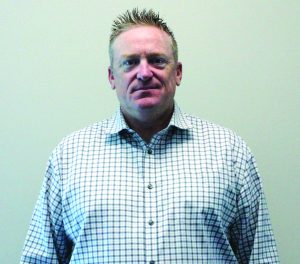
Feeling beleaguered by personal or work-related problems? Overwhelmed by an addiction, a family crisis, financial challenges or even the numerous tensions arising from working on projects with tight deadlines and demanding circumstances? Not long ago, you might have felt obliged, at least on site, to simply suck it up, maintain your composure, tough it out and get the job done. However, workplace attitudes towards mental health and personal wellbeing are changing, with age-old stigmas gradually giving way to a more compassionate, holistic approach and an understanding that entire teams benefit when employees are physically and mentally healthy and fit for duty. And construction circles are no exception, with companies looking to exchange an old school reputation for a modern-day one that values wellbeing across the enterprise.

Paul Trudel
Paul Trudel, senior vice-president of people and culture with EllisDon, worked in hospitality and tourism before moving into construction a decade ago and has watched attitudes shift across multiple sectors.
“It was like, don’t talk about what’s bothering you, you’re here to do a job,” Trudel recalls. “You were expected to deal with whatever might be bothering you when you got home.”
However, a generational shift in attitudes is turning the tables, with younger people willing to reorder their lives in order to find satisfying work where they feel respected and valued.
“It’s a candidate marketplace, and I think the challenges around recruitment are stemming a lot from mental health,” Trudel says. “People are burnt out, struggling and having challenges in the workplace, and it’s causing them to make employment decisions, whether it’s going somewhere else or not even staying in construction.”
Trudel says routine safety reminders were already in place when he joined Ellis-Don four years ago, but these now include mental health as well as physical safety.
Toolbox Talks, where crews meet daily to map out project plans, embed discussion about stress, fatigue, substance abuse and the need to embrace diversity and inclusivity.
“Gone are the days where we’ve just talked about what we’re building today and what needs to get done,” Trudel says. “Our training has expanded from slip and falls and working at heights to including a lot more around mental health.”
EllisDon has also bolstered its employee assistance program.
“It used to be an orientation brochure with a phone number you could call and only a small paragraph talking about wellness and mental health, and today it’s an interactive guide along with other resources,” Trudel says.
EllisDon also recently brought in a back-up service provider explicitly equipped to address emergency situations.
“They’ve got counsellors and a doctor on staff for pressing, urgent matters which demand immediate attention,” Trudel says.
While these kinds of services are seen as vital to employee wellbeing, a company-wide culture that respects and values mental and emotional wellbeing is increasingly seen as the ultimate enabler. Trudel recalls a watershed moment when an employee approached a top executive and, in the course of casual conversation, confided uncertainty about how to handle a serious crisis.
“It was right at the beginning of COVID, and the executive called me and asked if I knew what was going on,” Trudel recalls.
Arrangements were immediately made for an action plan, including emergency counselling. An environment where an employee feels comfortable going to a top executive with a sensitive or personal matter is exactly what employers need to achieve, Trudel says.
“We need to create a safe working environment where people can have a good, solid conversation if they’re struggling or need help. The more we listen and the more that we make it acceptable to talk about it, the better off we’re all going to be,” he says.
While contractors bear overarching responsibility for their projects, subcontractors and other specialists also have key obligations when it comes to job site culture and mental health.
Mammoet, an international provider of heavy equipment and operational services, participates in some of Canada’s most complicated projects, often performing challenging manoeuvres in highly precarious terrain under nail-biting conditions, so mental and emotional wellbeing is considered essential to the company’s everyday activities.
“Mental health is at the forefront of every discussion we have,” says Marie Aitken, manager of safety, health, environment and quality (SHE-Q) with Mammoet Canada Western. “Most meetings start with a conversation about mental health, reinforcing that we all have stress in our lives and that we have an open-door policy.”
While mental health encompasses a broad range of conditions, personal stress occurs often enough not only on job sites but also in office settings.
“Most times, the concerns in the field are personal concerns about family,” Aitken says. “People work away from home, they’re away from their families, and that can be a huge stressor.”
In the office, Aitken says, stress can have more of an interpersonal dimension.
“You’re around the same people all day, and that can naturally get under people’s skin. You hope people you put in groups will work well together, but sometimes it doesn’t,” she says.
Aitken has taken mental health first aid training through the Mental Health Commission of Canada and has helped Mammoet incorporate mental health into the company’s own training regimen. Through her own training, Aitken says she’s learned how to recognize, respect and respond to mental health concerns, and she compares the support management can provide as akin to administering first aid to an employee experiencing chest pains.
“If a person is feeling distressed, you’re not going to tell them to get over it. We now have tools in our tool chest to be able to discuss how someone is feeling, and we work through strategies just like you would with a physical illness,” she says.
Ultimately, Mammoet seeks a proactive approach, Aitken says.
“As a company, we do our due diligence to ensure everyone is kept safe, and we’re here to support our employees and ensure they are healthy both physically and mentally,” she says.
Supervisors are trained to spot signs of distress and to supportively direct workers to appropriate resources.
“It’s about making sure your crew is visibly ready to work and engaging in those conversations,” Aitken says. “Our hope is that having very normal conversations in management carries down to operations supervisors and creates that culture.”
No stranger to heavy equipment, the International Union of Operating Engineers Local 793 offers mental health support, including counselling and access to a treatment centre, through its members’ benefit plan and is on the cusp of formally incorporating mental health content into training it provides its members in machines as varied as excavators and tower cranes.

Dave Turple
Dave Turple, vice-president and assistant business manager with Local 793 in Ontario and Nunavut, says its first cohort of heavy equipment instructors is slated for Mental Health Commission of Canada train-the-trainer sessions this September to boost their understanding of and ability to address mental health.
Turple operated a mobile crane from 2003 until 2012, when he began working full time for Local 793, and knows that working with heavy equipment can be stressful.
“Often, you’re operating cranes near roadways, bridges and busy street corners where people are walking and driving, and you’re interrupting the flow of traffic. So, if you’re operating a crane or other heavy machinery it’s important to be on your game because there’s a risk of harm to the people you’re working with and to the general public.”
MaxPeople, a Toronto-based human resources consulting firm, has clients in construction, engineering and infrastructure, and founder and CEO Julie Ruben Rodney recalls a time when workplaces were less open about mental wellbeing.

Julie Ruben Rodney
“You will always have employees who are private and won’t want to share, however, employers can lead their teams with empathy and compassion through the creation of diversity, equity and inclusion policies, cultivating a safe environment, and ensuring you have the necessary resources in place,” she says.
Ruben Rodney says some of her clients incorporate wellness topics into morning safety huddles and even casually observe body language to potentially spot employees who might need a kind word or helping hand.
“We’ve had clients who have done pulse checks of their employees. Whether through surveys or one on one, they were constantly looking at engagement, trying to figure out how people are feeling,” she says.
MaxPeople has also helped clients develop post-COVID return-to-work surveys to gauge anxieties and identify ways the company might adapt.
Leadership also starts at the top. Ruben Rodney recommends deliberate efforts to create open dialogue and a willingness by executives and management to open up even modestly about their own lives and experiences.
“You’re more likely to get your employees to share with you if you share with them,” she says. “You can’t simply roll out your employee assistance program — you bring it front and centre and make it the fabric of your culture.”
HELP IS AVAILABLE:
If you or someone you know is in immediate danger, call 9-1-1
Canada Suicide Prevention Service (24/7/365)
Phone: 1-833-456-4566 • Québec: 1-866-277-3553 • Text: 45645
Workplace Strategies for Mental Health
Disaster Distress Helpline: Phone: 1-800-985-5990
National Domestic Violence Hotline: Phone: 1-800-799-7233




